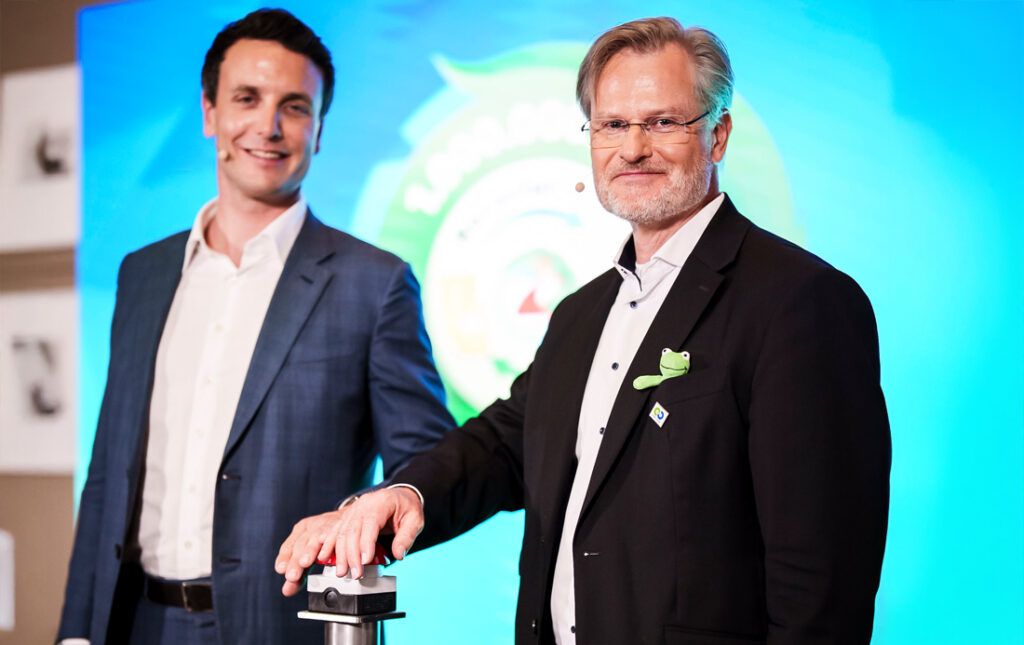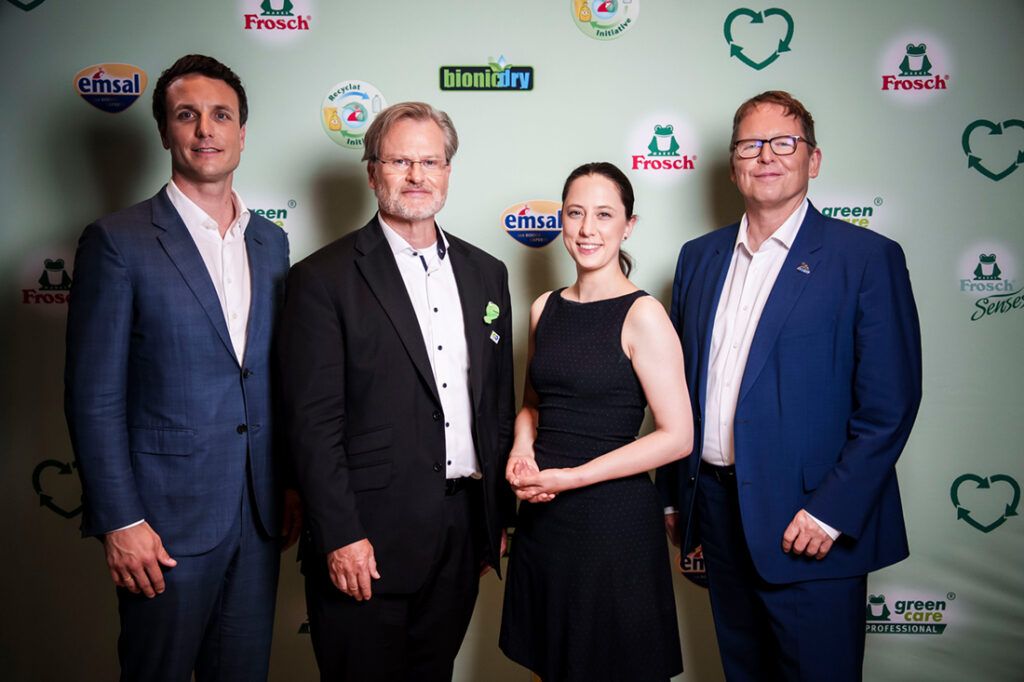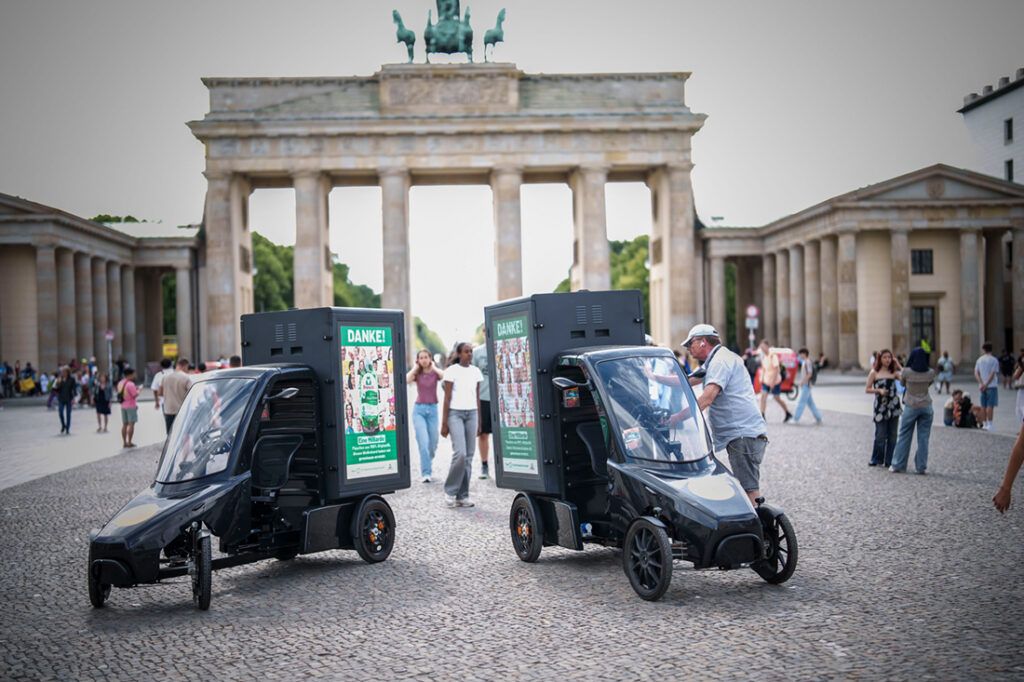Werner & Mertz sets a world record: one billion bottles of 100 percent Post-Consumer Recyclate!
Another milestone: Effective immediately, Werner & Mertz will begin converting the rPET bottles for the Frosch brand to 100 percent recyclate from the Yellow Bag!
A Rhineland-Palatinate medium-sized enterprise shows the rest of the world how it’s done. The Mainz cleaning products manufacturer Werner & Mertz – best-known for its Frosch brand – set a new world record on 23 June. Since the start of its Recyclate Initiative, the eco pioneer has brought one billion rPET bottles of 100 percent Post-Consumer Recyclate to the market.

Together with like-minded cooperation partners along the entire value chain, Werner & Mertz launched the Recyclate Initiative in 2012 and since then has advanced the mechanical recycling of used plastic for high-quality closed-loop circulation of packaging.
The company, considered a pioneer for recyclable products beyond its own industry, repeatedly sets new standards for ecological feasibility, particularly in the use of material from the Yellow Bag for its packaging. At the world record celebration in Berlin, Werner & Mertz owner Reinhard Schneider announced the next milestone. Effective immediately, Werner & Mertz will begin converting the rPET bottles for the Frosch brand to 100 percent recyclate from the Yellow Bag!
With the achievements of its initiative, Werner & Mertz demonstrates that it is possible to offer effective, verifiably resource-sparing products which do not demand that consumers give up quality, performance or sensory experience.
“We are not making ascetic products for a niche market; we are specialists in making a sustainable lifestyle attainable for the majority. The key is a cheerful appeal. To that end we bank on the best combination of consistent, highly effective resource efficiency per product and achievable reach in terms of market share,” says Schneider.
Demonstrating courage with cooperation partners
When Werner & Mertz founded the Recyclate Initiative, it set aside the problem of what came first—the chicken or the egg. Hardly any company used recyclate at that time because it was significantly more expensive than plastic made from fresh crude oil, which is also known as “virgin plastic”. Economies of scale would make recycling less expensive, but someone had to take the first step by investing in recyclate. Werner & Mertz demonstrated that courage and sought partners along the value chain. Current partners include NGO NABU; plastic specialist Alpla; packaging concern Mondi Group; and, the most recent addition, waste and recycling company PreZero.
“The recycling of plastic reduces our overly high use of raw materials and thus helps to protect the climate and environment. With pioneering spirit, Werner & Mertz has innovatively and courageously forged ahead in its decision to use one hundred percent recyclate from the Yellow Bag. NABU has supported this commitment since the start. We need effective examples of how the circular economy functions in practice,” said NABU President Jörg-Andreas Krüger.
“Successes like this one satisfy the longing for good news and show that a lot can be accomplished by working resolutely. They are the antidote to the widespread feelings of helplessness in the face of current crises,” said psychologist Katharina van Bronswijk, who spoke at the celebration about the positive experience of self-efficacy.

Major milestones of the Recyclate Initiative
Reaching the one billionth bottle of 100 percent Post-Consumer Recyclate is only the most prominent example among many milestones achieved within the initiative to date. Particularly noteworthy is the continuously increasing share of Yellow Bag material in packaging over the past 11 years:
- 2014: pilot testing of Frosch dishwashing detergent in rPET bottles made of 100 percent Post-Consumer Recyclate, 20 percent of which comes from the Yellow Bag (80 percent from European deposit bottle collection – disposable and reusable bottles)
- 2016: rHDPE bottles of 100 percent recyclate from the Yellow Bag (for emsal and Green Care Professional brands)
- 2019: first bottle produced with 100 percent rHDPE from the Yellow Bag, for use in cosmetics sector (Frosch Senses shower gel)
- 2021: Increase from 20 to 50 percent Yellow Bag material in rPET bottles (50 percent from European deposit bottle collection)
- 2023: Increase from 50 to 75 percent Yellow Bag material in rPET bottles (25 percent from European deposit bottle collection)
Now, since 23 June 2025, the increase to 100 percent Yellow Bag material in rPET bottles! Yet another fantastic pioneering achievement by the initiative, especially today when large quantities of recyclable packaging in the Yellow Bag are still senselessly burned and turned into CO2 because there is a lack of industrial demand.
The increases in the share of Yellow Bag material were made possible by the high technical standard of the sorting facilities along with acquired knowledge and close monitoring of the plastic bales delivered to the recycling plant. On site, packaging experts from Werner & Mertz regularly inspect the plastic bales and evaluate the quality of the materials available for recycling. Knowledge about this waste stream goes into process development.
“A strong vision, close cooperation and the use of the newest technologies made it possible for us to develop a consistently good recyclate product despite changing conditions in the Yellow Bag stream,” said Alpla CEO Philipp Lehner.
“Thanks to years of development with our partners, modern recyclate can be called a ‘drop-in solution’. That means the recyclate can be used in place of new plastic without requiring any major modifications to existing production systems,” says Alexander Schau, Head of Packaging Development at Werner & Mertz.
More technological and pioneering achievements in pouches and caps
Once the Recyclate Initiative had successfully converted the PET and HDPE plastics to 100 percent used plastic from the Yellow Bag, the next step was driving forward the technological development of packaging made of PP and LDPE.
In 2018 Werner & Mertz brought to market the first high-quality recyclable stand-up pouch of a monomaterial. The pouch reduced the amount of required plastic by 70 percent compared to a rigid bottle with the same fill volume. The one drawback: Until that time, it had not been possible to produce the pouch from recyclate because there was not enough film packaging available that complied with Design for Recycling guidelines. So the initiative launched another lighthouse project to solve that problem. Effective immediately, 27 percent of the total packaging consists of Post-Consumer Recyclate from the Yellow Bag!
Most closures on Werner & Mertz products, as for these product groups, consist of polypropylene (PP). In 2022, the company did without the green pigment for the Frosch brand, switching to transparent colorless closures for the sake of optimized recyclability. In the same year, Werner & Mertz jointly developed with a cooperation partner a trigger spray head made of a monomaterial (PP), which was, for the first time, completely recyclable. In a worldwide first, the functional internal components of the pump are made of Post-Consumer Recyclate (29 percent). In the Business to Business area Werner & Mertz brought to the market a new packaging system for professional cleaning, consisting of a refillable recyclate bottle with integrated PP dosage mechanism of 100 percent recyclate. In the next step during the current year, many closures for the Frosch brand will be converted to gray recyclate with the goal of recycling this material too at a high quality.
“When developing our projects, we always ask ourselves: ‘How far can we go in terms of sustainability and the circular economy without our consumers having to give something up?’ As far as the closures are concerned, our customers have come to accept the color grey and still enjoy the products. But the interim step of the colorless closures was important to getting there,” says Schneider.
Demands made on politicians in Berlin and Brussels:
With its Recyclate Initiative, Werner & Mertz has proven hundreds of millions of times the scalable feasibility of its approach—for cosmetic products too. Despite all this progress and financial success, very few companies use high-quality recyclate from the Yellow Bag. That cannot be attributed to any technical reasons, but rather to a lack of political interest in creating a level playing field for recycled materials and plastics made from crude oil. Therefore, the medium-sized enterprise, together with like-minded associations, NGOs and its cooperation partners, will continue demanding that politicians create general conditions to strengthen the circular economy. The following are some of the measures:

Polluter pays the plastic tax:
Instead of making all consumers bear the burden of the plastic tax, the distributor of climate-damaging new plastic should pay the tax while Post-Consumer Recyclate remains tax-exempt. These measures generate an economic incentive for increased investment in recycling technologies.
Elimination of subsidies for climate-damaging fossil resources:
The legal favoritism for new plastic – such as the exemption from the energy tax – should be terminated. Instead, funding should be redirected to support innovations in the recycling sector.
Establishment of a binding legal framework:
Legal minimum quotas for the proportion of recycled material in new goods should be introduced, coupled with incentives for exceeding the target by up to 100 percent, and binding quality standards for imported recyclate.
Promotion of innovation and investment in recycling technologies:
A fund should be set up into which all companies that use new plastic would pay. The funds should flow into research, development and the expansion of modern, high-quality recycling processes.
Inspection and certification of imported recyclate:
Recycling facilities in foreign countries should be required to prove by means of independent audits that they meet European quality and environmental standards. Only equivalent recyclate may enter the European Single Market.
Green Public Procurement as strategic lever:
Government support of the circular economy as with consideration of recyclate and recyclability as criteria in requests for bids.
The increased use of recycled material contributes to resource sovereignty; makes Germany, which lacks primary raw materials, less dependent on imports; and strengthens the country‘s resilience in the long term.
Additional Information:
Recyclate Initiative Chronology
Dates, Facts & Figures
Website wir-fuer-recyclat.de/en